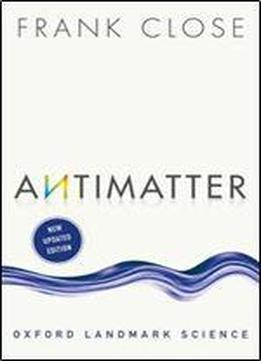
Antimatter, Second Edition
by Antimatter /
2019 / English / PDF
84.9 MB Download
by Frank Close (Author)
Antimatter explores a strange mirror world, where particles have identical yet opposite properties to those that make up the familiar matter we encounter everyday where left becomes right, positive becomes negative and where, should matter and antimatter meet, the two annihilate in a blinding flash of energy that makes even thermonuclear explosions look feeble by comparison.
It is an idea long beloved of science-fiction storiesbut here, renowned science writer Frank Close shows that the reality of antimatter is even more fascinating than the fiction itself.
We know that once, antimatter and matter existed in perfect counterbalance, and that antimatter then perpetrated a vanishing act on a cosmic scale that remains one of the greatest mysteries of the universe. Today, antimatter does not exist normally, at least on Earth, but we know that it is real for scientists are now able to make small pieces of it in particle accelerators, such as that at CERN in Geneva.
Looking at the remarkable prediction of antimatter and how it grew from the meeting point of relativity and quantum theory in the early 20th century, at the discovery of the first antiparticles, at cosmic rays, annihilation, antimatter bombs, and antiworlds, Close separates the facts from the fiction about antimatter, and explains how its existence can give us profound clues about the origins and structure of the universe.
Oxford Landmark Science books are 'must-read' classics of modern science writing which have crystallized big ideas, and shaped the way we think
About the Author
Frank Close, OBE, is Professor of Physics at Oxford University and a Fellow of Exeter College. He was formerly vice president of the British Association for Advancement of Science and Head of the Theoretical Physics Division at the Rutherford Appleton Laboratory. He is the author of several books, including the best-selling Lucifer's Legacy, and the winner of the Kelvin Medal of the Institute of Physics for his "outstanding contributions to the public understanding of physics."











